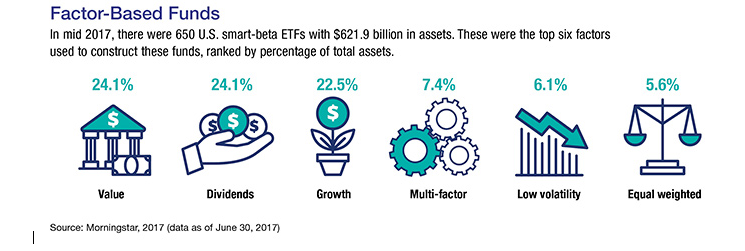8.16.18
Is smart beta smart for you?

Traditional investment indexes such as the S&P 500 are weighted based on market capitalization, the value of a company’s total outstanding stock. This means the largest companies in the index may have much greater influence than smaller companies on index performance — and on funds that track the index. For example, the 10 largest companies in the S&P 500 account for about 20% of the index’s performance, as opposed to about 2% for any 10 companies if every company were weighted equally.1
Funds that track market-weighted indexes may be the most direct way to participate in broad market performance, but there has been increasing interest in an alternative indexing strategy called smart beta, also known as strategic beta or factor-based investing.
Shifting the Weight
Smart-beta funds track indexes that are selected and weighted based on factors other than market capitalization. A given fund might track an existing index or an index that is newly created for that specific fund. Some factors that might be considered are momentum, risk, volatility, earnings, growth potential, price-to-book value, dividend growth or yield, cash flow, and equal weighting of all securities.
Indexes and the funds that track them may focus on a single factor or multiple factors. Some funds categorized as smart beta, particularly those focusing on growth and value, follow indexes that use multiple factors to select stocks but weight the stocks based on market capitalization.
Pushing for Performance
Beta is a measure of a fund’s sensitivity to market movements. The goal of most smart-beta funds is to outperform the broader market, either by increasing returns or by managing risk. But if a factor does outperform during one market cycle, it may underperform in the next cycle. This is one of the fundamental challenges of any strategy that attempts to outperform the market. Even within a given cycle, a successful strategy may become neutralized or unsuccessful as other investors adopt the same strategy.
Because of these limitations, smart-beta funds are typically used with traditional broad-based market funds in a diversified portfolio. Diversification is a method used to help manage investment risk; it does not guarantee a profit or protect against investment loss.
The S&P 500 is an unmanaged group of securities considered to be representative of the U.S. stock market in general. The performance of an unmanaged index is not indicative of the performance of any specific investment. Individuals cannot invest directly in an index. Past performance is not a guarantee of future results; actual results will vary.
The principal value of mutual funds and exchange-traded funds will fluctuate with changes in market conditions. Shares, when sold, may be worth more or less than their original cost. Supply and demand for ETF shares may cause them to trade at a premium or a discount relative to the value of the underlying shares.
Mutual funds and exchange-traded funds are sold by prospectus. Please consider the investment objectives, risks, charges, and expenses carefully before investing. The prospectus, which contains this and other information about the investment company, can be obtained from your financial professional. Be sure to read the prospectus carefully before deciding whether to invest.
1) S&P Dow Jones Indices, 2017
This information is not intended as tax, legal, investment, or retirement advice or recommendations, and it may not be relied on for the purpose of avoiding any federal tax penalties. You are encouraged to seek advice from an independent professional advisor. The content is derived from sources believed to be accurate. Neither the information presented nor any opinion expressed constitutes a solicitation for the purchase or sale of any security. This material was written and prepared by Broadridge Advisor Solutions. © 2018 Broadridge Investor Communication Solutions, Inc.
* Non-deposit investment products and services are offered through CUSO Financial Services, L.P. (“CFS”), a registered broker-dealer (Member FINRA/SIPC) and Registered Investment Advisor. Products offered through CFS: are not NCUA/NCUSIF or otherwise federally insured, are not guarantees or obligations of the credit union, and may involve investment risk including possible loss of principal. Investment Representatives are registered through CFS. Consumers Credit Union has contracted with CFS to make non-deposit investment products and services available to credit union members.












